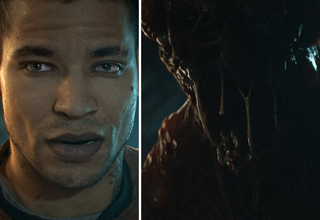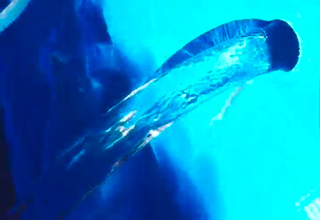The DUI Exception to the Constitution
I would like you to imagine for a moment that youve gone to a friends house for dinner. In the course of a very good dinner youve had a couple of glasses of a good Petit Serah and it is now time to drive home. I would like you to imagine that you are on your way home and, I will tell you parenthetically, by the way, that two glasses of wine will not, in any state, put you under the influence of alcohol or over the legal limit of .08, or .10 depending on your home state. As you are driving along the highway, you see ahead of you some flashing lights and barricades and police cars accordioned across the highway, with flashing lights directing you into an increasingly small channel. And, as you go in, you are stopped and two police officers approach you and stick a flashlight in your face and say, "Breath on me. Have you been drinking tonight? Please step out of the car."
Some of you say, "Well that cant happen in the United States. We
have the Fourth Amendment to the constitution, which says, 'police
officers have to have probable cause to stop you. They have to have a
reason to believe youve done something criminal before they can stop
and detain you.'" And so said the Michigan Supreme Court in the case of
Sitz vs. Michigan. The Supreme Court of Michigan said, "The Fourth
Amendment does not permit these types of roadblocks." And reversed the
DUI conviction. They went up to the United States Supreme Court,
unfortunately and that august body decided 5 to 4 that somewhere in the
constitution there is something called a DUI Exception. And in a 5 to 4
vote sent it back to Michigan saying there is no violation here. Whats
interesting is the Michigan Supreme Court, bless them, for there are
fewer and fewer of them, said, "Well, if you will not protect our
citizens in the state of Michigan from this kind of police conduct, we
will. And we again reverse the conviction and this time we rely upon our
own state constitution."
The state of Washington and three other states have followed suit. In 46 states today it is legal to stop you for absolutely no reason other than the fact that you are driving a car. But only to check you out for drunk driving.
You have been stopped, you have been taken out of the car and you have been handcuffed. You are placed in a police vehicle and you are on your way back to the police station. About this time youre probably wondering Ive seen this TV show somewhere theyre supposed to read me something arent they? Something called Miranda? Arent I supposed to have a right for an attorney? A right to remain silent? Because, as youre driving, the officer's asking you all kinds of questions. Like, "Where have you been?" "Where are you coming from?" "How much have you had to drink?" "How long ago was it?" "When was the last drink?" "Do you feel the effects?" "Where are you now?" "What time is it?"
Well, again, a state Supreme Court said, "Hey, this persons handcuffed under arrest, youve got to advise him of his constitutional rights under Miranda." And again, it went to the United States Supreme Court in the case of Birkemer vs. McCarty in 1984. The Michigan vs. Sitz case was 1990, by the way. In Birkemer vs. McCarty, the [United] States Supreme Court fooled around for about 20 or 30 pages of opinion and finally concluded that there was a DUI exception to the constitution. And that, "Well, we really cant tell you when youre supposed to give Miranda in a DUI case. We do know that it is later than in other types of criminal investigations." So, U.S. Supreme Court has told us we dont know when Miranda is supposed to be given in DUI cases, but it is clearly some time later.
Well, about this time you arrive at the police station and the officer takes you into a room and there is this little metal box about the size of an IBM typewriter. Some of you may remember those. And he says breathe in here. And you say, "Wait a minute, I have a right to an attorney. Can I make a phone call?" "No". And hes right. Only in DUI cases. Hes right. Youre about to give the most incriminating evidence it is possible to give in a DUI case and you have no right to seek the advice of an attorney as to whether to breath into that machine or to attempt a urine or a blood test in the alternative.
And Im only touching on a few of the problems. In California, for example and in many other states, the law says you have a right to choose between breath, blood and urine. Your choice. We have discovered in California, through our own Supreme Court that when the officer doesnt give you that choicejust makes you breathe into that little black boxthats okay. Theyre not supposed to do it, but theres no remedy. Theres nothing that can be done about it. You cant suppress the evidence. Police are not stupid, so now about half of them simply dont give you that choice, since nothings going to happen if they dont. So you find out that you have no right to consult with an attorney.
Your next thought is, "I dont know if I trust that little machine. Maybe I should refuse to breath into it. I think Im okay because, becase as I remember, theres a Fifth Amendment right in the United States constitution that I dont have to incriminate myself and, not only that, but if it goes to trial, the prosecutor cannot even refer to the fact that Ive exercised my Fifth Amendment right."
The South Dakota Supreme Court, in Neville vs. South Dakota agreed a few years ago and they said, "This gentleman refused to incriminate himself by breathing into that machine and it was reversible error for the prosecutor to comment upon that to the jury and tell them that he refused, because he knew he was guilty." Now youre probably ahead of them. It went to the United States Supreme Court. The United States Supreme Court, in South Dakota vs. Neville in 1983 said, "Theres a DUI exception to the Fifth Amendment. There is no right to refuse and the prosecution can comment freely in trial upon that refusal." And they sent it back to South Dakota. And South Dakota said "If you in Washington will not protect our citizens, we will rely upon our own state constitution," and they reversed it again based upon the South Dakota constitutions provisions against self-incrimination. Thats the last story I have of the State Supreme Court exercising protections of its own citizens.
So, you decide youre going to breathe into that machine. And you do. You breathe into one end and out the other end comes a piece of paper that says your blood-alcohol concentration is .13. Now, at this point, in most states, the police are supposed to give you a choice as to whether you want a urine or a blood saved as well, so that you have something for your defense attorney to examine with an independent analyst rather than [rely] upon a crime lab of that very same law enforcement agency.
This is called the Trombetta Advisement. They dont give it usually. Theyre supposed to, but if they dont, no harm, no foul and so it rarely isnt done. Its called the Trombetta Advisement because a few years ago, in 1984, a defendant in California said, "Wait a minute, that machine captured my breath and minutes after analyzing it, just purged it into the room air. It could have saved the breath. (Very easy to do. Costs about $1.50 for a special kit to just preserve it.) It could have saved the breath and then my attorney could have had it analyzed by a separate laboratory. You have destroyed evidence that I could have analyzed and may have been exculpatory." This went to the United States Supreme Court and in Trombetta vs. California, the Supreme Court found yet another DUI exception to the constitution and said "Well, it would be nice if they saved the breath, but theres no obligation to do so. And destruction of that evidence, unless you can prove that it would have been exculpatory, has no impact." So, today it is alright to destroy the evidence after you get your own results and make sure the defense doesnt get a-hold of it.
Finally, youre rather outraged because you know youre not under the influence. You know youre not over .08, which is the California standard and the standard in about a third of the states today. And in 10 years will be the standard in all of your states because the federal government is telling you thats what its going to be. And the Mothers Against Drunk Driving are ensuring that happens. You decide to go find one of these people completely without any social value and ask them to represent you in trial. You want to tell a jury of 12 of your peers what happened. You want to give your version. So you tell your attorney, "I want a jury trial." Your attorney says, "I am really sorry, but you cant have one. You see we dont have jury trials for DUI cases in this state, because in 1989 the United States Supreme Court in Blanton vs. North Las Vegas, a DUI case, said, "There is no constitutional right to a jury trial in a DUI case, so long as its not punishable by more than six months in jail."
So, in four states today, obviously including Nevada, you have no right to a jury trial. And the Mothers Against Drunk Driving and a few other organizations are doing everything they can to make sure there are no jury trial rights in other states as well.
All right, weve taken a look at what happens to you as you go through the process in terms of any constitutional rights you thought you had. And if youd been charged with burglary, murder, rape, you would have had those rights. At least for now.
Now, lets take a look at what the crime itself is. What is the offense you just committed? I will tell you, that when I have clients come in the door, almost none of them know what the crime is and probably half of them dont know if theyre guilty or not.
In the beginning there was a law. That law said thou shalt not drive under the influence of alcohol. Period. It was a good law. We need it. It addressed the problem. It was fair. Unfortunately, there were some defendants being acquitted. And so an inventor came along and said, "Well, Ive got this super neat little gizmo here. I call it the Breathomatic. Its a box and if you breath in this end, out the other end comes this piece of paper and itll tell you exactly how much alcohol is in the persons blood, which is going to the brain."
Well, that sounded pretty cool. And so legislators and prosecutors and MADD approached the American Medical Association and said, "Weve got this great machine. Can you tell us at what level of alcohol concentration a person is impaired in their ability to drive a vehicle?" And the AMA said, "After extensive research it is .15 percent." This was about 30 years ago... .15 percent.
Well, that was okay for awhile, but a whole lot of people were not getting convicted. Part of the problem was there was only a presumption that you were under the influence. In other words, the jury could accept if you were over a .15 that you were under the influence, or they could reject it and say other evidence shows that he wasnt under the influence. Second problem is that a lot of people were coming in at .13, .14, .12. Third problem is, you were .15 at the time of the test in the station, but what were you an hour earlier when you were driving?
So, those organizations went back to the AMA a few years later and said, "Are you sure about that .15. Couldnt it be a little lower?" And the AMA said, "You know, youre right. Its a .10." Now, the human body, to my knowledge, had not changed in those 20 years, but certainly the American Medical Associations research did. And replied to considerable political pressure. So, now jurors were told that they could presume guilt if there was a .10%.
Unfortunately, there were still defense lawyers out there and there were acquittals and the Mothers Against Drunk Driving, a very effective, very well financed organization, as some of you here know, was successful through a federal agency called National Highway Traffic Safety Administration in putting pressure on states to drop it further to .08%. And I indicated earlier, about a third of the states have done exactly that, the others are following suit.
Well, theres no question, there are fewer acquittals now and the prosecutors were upping their, their conviction rate. But, there were still some acquittals. And so MADD and the other federal agencies decided to change the law further. More accurately, to come up with another law. This is called the per se law. If we cant convince jurors that a person is under the influence over .08 we can make the crime being over .08. The crime is being over .08 per se. We dont care if theyre intoxicated or impaired. If they have over .08% blood-alcohol, or .10% blood-alcohol perhaps, in your state; that is a crime. Not only that, lets keep the original law. So, now we get the prosecutors two shots: If they cant convince the jury hes under the influence, well then maybe they can convince them he was over .08, even though he was not under the influence and visa versa.
Well, this once again certainly increased the conviction rate and the number of acquittals continued to drop. But there was a problem, again and were going to get into it, if I have time, a little bit about the technology involved in breath alcohol analysis. But, the machine, to put it simplistically, assumes that you are an average person. Okay? It is measuring the breath. It is measuring the alcohol in the vapor of the alveolar air in the deep lungs that you expel and is analyzed in the machine. The machine is telling you how much alcohol is in the blood. Not in the breath. There is what we call a partition ratio. To put it simplistically, the machine has a very primitive Z80 computer. There are different machines, but the computers will all say, "Well, if youve got this much in the breath, there must be 2100 times as much in the blood," and thats what it prints out. .14% blood-alcohol.
But the computer is assuming that your partition ratio is 2100. Problem. Very few people have a partition ratio of 2100. It ranges anywhere from about 1100-to-one up to 3500-to-one. And there is no way of knowing at the time what your partition ratio was. You are going to be very different than you. You, your partition ratio tomorrow is going to be different than what it is right now. Well, what does that mean? It means if you blow, let's say, a .11 and you have a 1300-to-one partition ratio, .11 is really .07. Youre innocent. Your crime was not being average.
Well, a few defense attorneys were able to master the technology involved and attorneys usually go to law school because they fail physics, chemistry and so on in college. Where else can you go? In that sense, Mr. Murray is absolutely right. But, a few of these defense attorneys were actually learning how this machine worked. And they thought, "Whoa! Theres an assumption here, 2100-to-one," and they cross-examined the expert from the law enforcements crime lab and said, "Isnt it a fact?" And the guy would hem and ha and so on and say, "Well, yeah." Acquittal. Its still a problem in a lot of states. Not in California anymore. In California, our Supreme Court, which is slightly to the right of the U.S. Supreme Court, said, "No, not really because see what youre doing is youre measuring the alcohol on the breath. Youre not measuring the blood directly, youre measuring on the breath and therefore we dont have to have a partition ratio." Now, you probably dont appreciate the complete idiocy of that statement, because the Supreme Court did not understand the technology involved. And it was an eight-to-one decision. The dissenting justice said, Joyce Kenner had said, "Do you realize that we just created a new crime called alcohol on the breath." And she was absolutely right. Thats what the Supreme Court of California did.
Result? If I now ask a law enforcement crime lab expert on the stand in front of a jury, "Isnt it a fact that the partition ratio you used assumes an average of 2100-to-one?" I will be held in contempt of court and jailed by the judge. If I try to bring out the truth, I will be jailed as an attorney. Im not exaggerating. And Im telling you that, approximately, to my knowledge, in four other states. I have lectured in 36 states to lawyers' groups, bar associations and so on, so Im somewhat familiar with the different states and their different approaches. All of which are becoming much more standardized as the Federal Government continues to step in.
Part 2 coming soon!






16 Comments